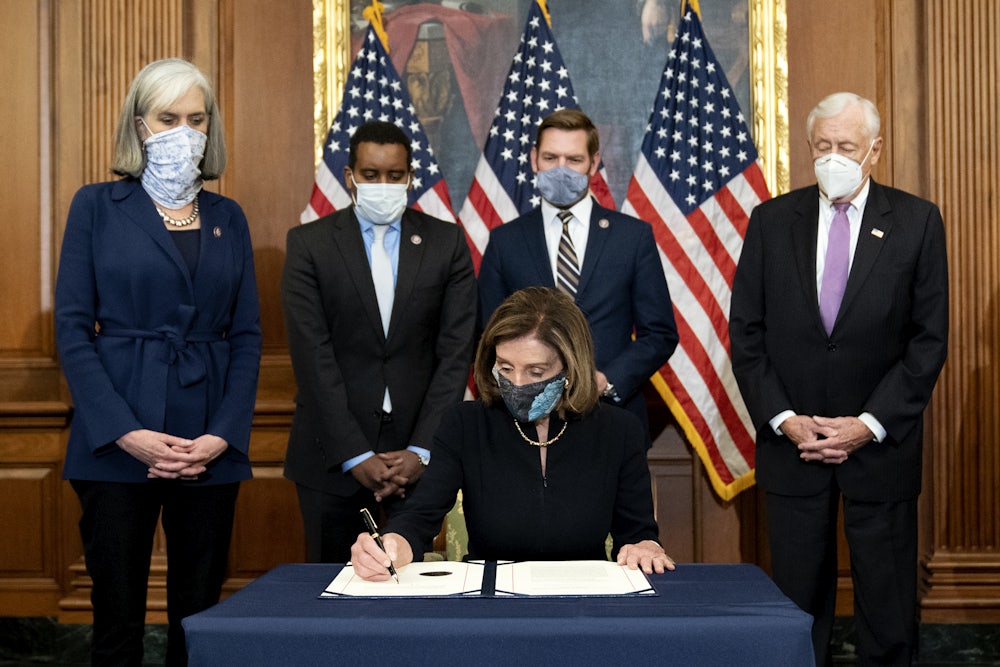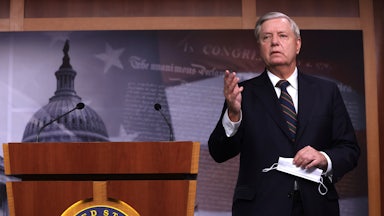Wednesday was the second saddest day in modern history on Capitol Hill.
As the House voted to impeach Donald Trump for a second time, the Capitol was ringed by more American troops than are on duty in Kabul or Baghdad. While not visible in the TV footage of the House chamber, members of the National Guard were everywhere in the Capitol, making the building look like the front lines of a civil war in a beleaguered fledgling democracy.
Despite the brave independence of Liz Cheney, who holds the number three GOP leadership post in the House, only nine other Republicans joined her in voting for impeachment. That’s right: The Republicans could not even muster a full soccer team of members who believed that Trump should be removed from office for fomenting last week’s assault on the Capitol.
Then, faster than you can say, “Lucy and the football,” Mitch McConnell dashed Democratic hopes yet again. Leaks that the soon-to-be Senate minority leader might vote to convict Trump gave rise to the hope that we would soon see the GOP uprising that believers in the two-party system have been fantasizing about for four years. Instead, McConnell issued a letter Wednesday afternoon making clear that, while he was undecided on conviction, there would be no Senate trial until Joe Biden takes office on January 20.
The Democrats would be hard-pressed to find satisfaction in anything related to the latest impeachment vote.
Yes, Trump is now the only president to have been impeached twice. But listening to Democrats and TV pundits crow about that infamous distinction, you get the sense that had the House not acted to impeach Trump, the president would have left office in a blizzard of rose petals. In reality, the Capitol riot on January 6 had already guaranteed that no mainstream historian would ever try to rehabilitate Trump’s reputation for the next half-century or more.
McConnell’s choice to delay a Senate trial until after January 20 means that Trump can still hand out pardons to himself and every co-conspirator and enabler from Ivanka on down. It still leaves Trump in charge of the nuclear codes for six long days. And even without Twitter, Trump still possesses many other ways to weaponize the presidency to punish his enemies and poison the incoming Biden presidency.
Nancy Pelosi, taking the unusual step of speaking on the floor at the start of the impeachment debate, declared, “The president of the United States incited this insurrection, this armed rebellion, against our common country. He must go—he is a clear and present danger to the nation that we all love.” That is sadly true, but thanks to McConnell, the “clear and present danger” will nonetheless continue until the final seconds of Trump’s four-year term of office.
The second Trump impeachment trial, as McConnell knows well, will also complicate the first weeks of the Biden administration. Once Kamala Harris takes office, giving Chuck Schumer the tie-breaking vote he needs to become majority leader, he could put his imprint on the schedule for the impeachment trial. And Schumer may be able to mandate the very long Senate workdays required to conduct a Trump trial without seriously delaying the confirmation of Biden’s Cabinet and other key appointments.
But no matter how quickly Senate Democrats complete the trial, Biden will still have to share the spotlight with a former president during the crucial opening days of the new administration. It inadvertently satisfies Trump’s fondest wish for perpetual attention—a split-screen presidency.
Perhaps some Senate Republicans will agree to convict Trump. Once he is out of office, they can break with him without fearing repercussions from the White House. More important to McConnell, though, is the fact that a handful of Senate Republican votes to convict Trump may convince corporate America to resume giving PAC money to GOP candidates.
Democrats may imagine that a formal Senate trial is what’s needed to alert Republican voters, at long last, to the realities of Trump’s thuggish, authoritarian ways. But it is equally likely that the impeachment trial would get bogged down in soporific legalisms. Already, the unctuous Alan Dershowitz, who has said that he would be eager to join Trump’s impeachment defense team for a second time, has argued that the Constitution does not allow impeaching a former president.
It is difficult to escape the conclusion that Trump’s impeachment represents a Pyrrhic victory for Democrats.
The 197 Republican votes against impeachment—just one week after legislators in both parties feared for their lives in the Capitol—underscore Trump’s enduring popularity with the GOP base. The delayed Senate trial also makes the impeachment battle entirely symbolic. Biden risks being overshadowed at just the moment when he needs to take command. And McConnell will be chortling at every turn.
The only salvation for the Democrats is that, at least, they won’t get to impeach Trump for a third time.








